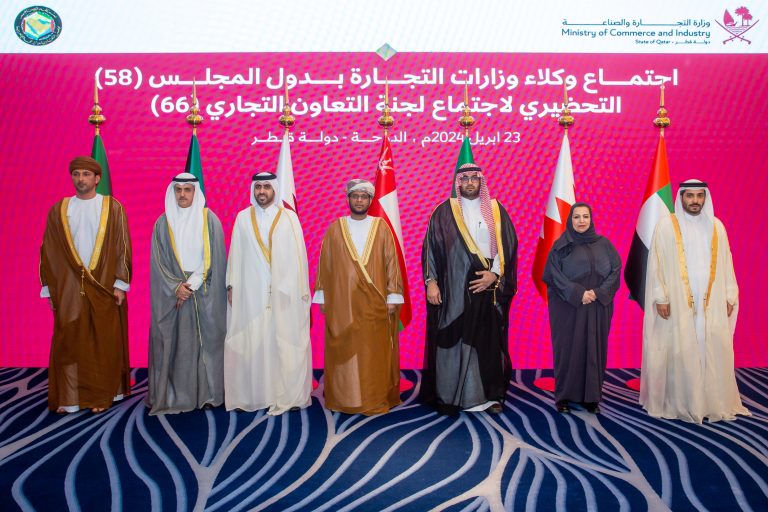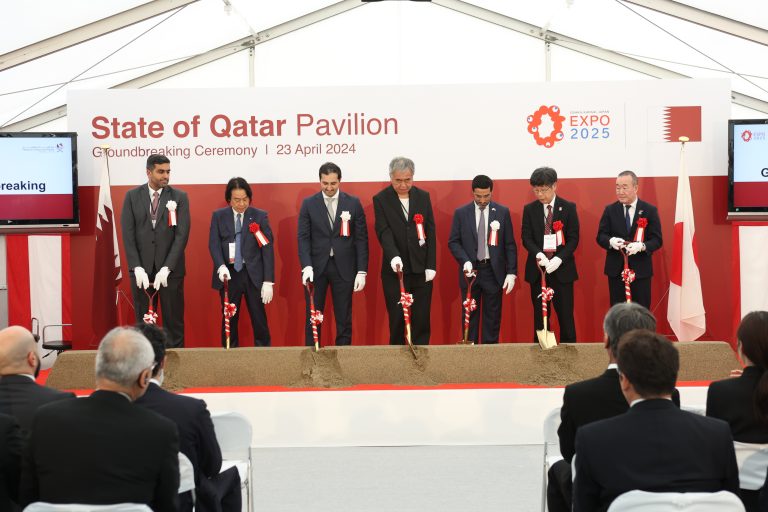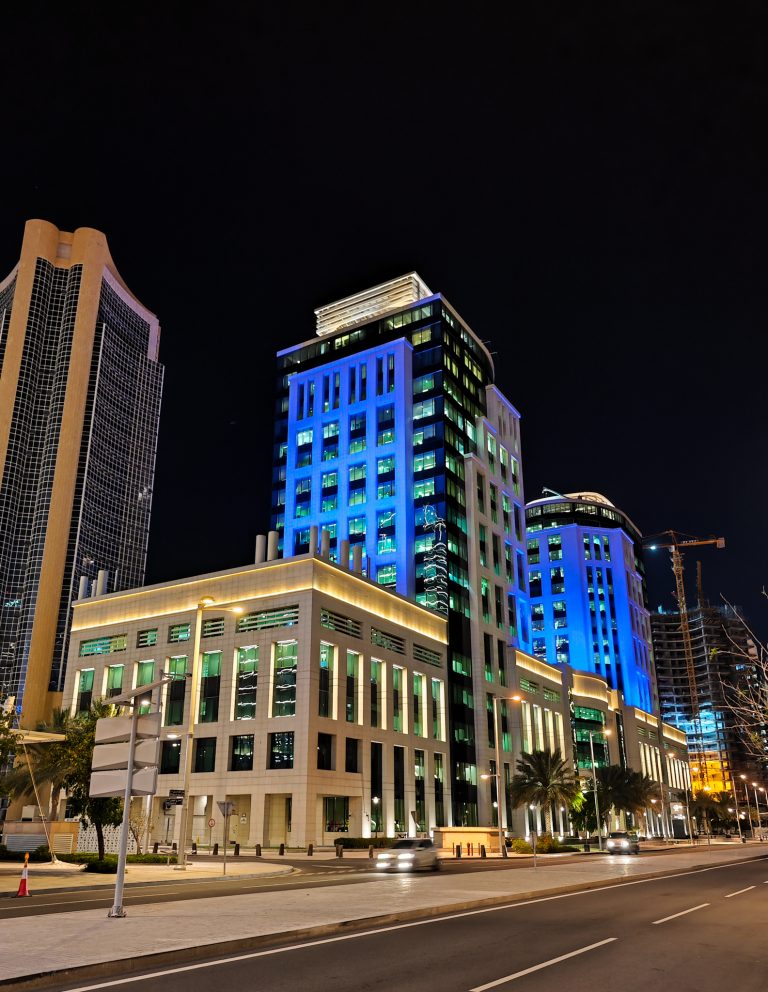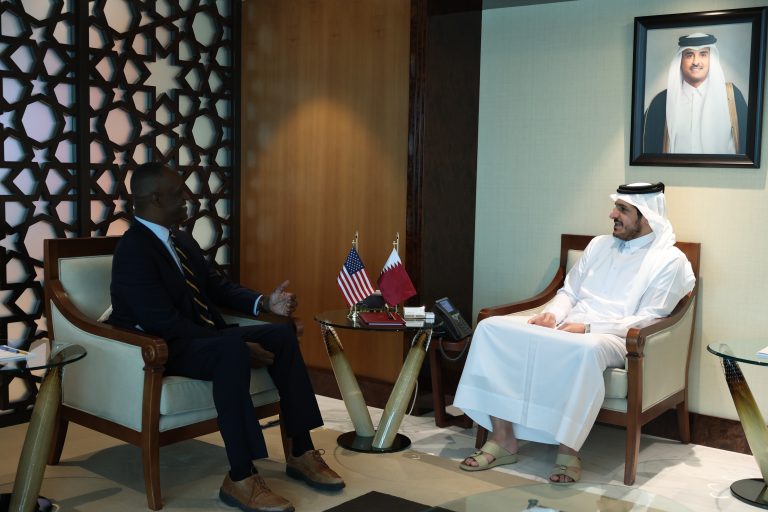· H.E. said Qatar’s partnership with China serves as a model for the country’s international economic relations.
· China ranks as Qatar’s third-largest trading partner.
· China accounts for 11.7% of Qatar’s total trade volume
· China represents an attractive destination for Qatari investments in the fields of shipbuilding, manufacturing, petrochemicals, technology, hospitality, tourism and financial services.
· Qatar’s foreign direct investments increased by 4% – the equivalent of $7.8 billion – to $186 billion for the first quarter of 2018, up from $178 billion at the end of 2017.
· Qatar’s trade balance hit a surplus of $52.5 billion in 2018 – an increase of 40% compared to 2017 – while exports increased by 25%.
His Excellency Ali bin Ahmed Al-Kuwari, Minister of Commerce and Industry, has emphasised that Qatar’s partnership with China serves as a model for the country’s international economic relations.
Speaking at the Qatar-China Business Forum in Beijing, H.E. noted that the two countries have enjoyed over three decades of diplomatic and economic cooperation and friendly ties, marked by the exchange of official visits.
His Excellency delivered his remarks at the opening of the forum, which was organised by the Ministry of Commerce and Industry and took place on Thursday, January 31.
Expanding Qatari-Chinese bilateral trade levels reflect the importance of this partnership and its promising prospects, H.E. said, noting that China ranks as Qatar’s third-largest trading partner.
Qatar-Chinese trade rose 27% in 2018 to $13.5 billion, accounting for 11.7% of Qatar’s total trade volume. Touching on Chinese investments in Qatar, H.E. said that more than 14 fully owned Chinese companies are currently operating in Qatar, in addition to 181 joint Qatari-Chinese firms.
On the other hand, China represents an attractive destination for Qatari investments in the fields of shipbuilding, manufacturing, petrochemicals, technology, hospitality, tourism and financial services among other vital industries.
Qatar and China are also bound by several important memoranda of understanding and agreements, which that contribute to the further development of bilateral ties, H.E. said.
He also noted the importance of breathing life into existing agreements, and ratifying new ones, to pave the way for fresh Qatari-Chinese private sector partnerships and joint investments that serve the aspirations of both countries.
In this context, H.E. invited Chinese companies to take advantage of the business and investment-friendly environment that Qatar offers to foreign investors, as evidenced by the nation’s high ranking by some the world’s most prestigious international institutions.
Globally, Qatar ranks first in terms of low inflation rates, sixth in terms of the effect of taxes on competition, eighth in terms of venture capital availability, and ninth in terms of financing small and medium enterprises (SMEs), according to the World Economic Forum’s Global Competitiveness Report 2018.
H.E. explained that Qatar’s significant success in this regard has been driven by the integrated policies established by the country’s wise leadership to open the economy, and attract investments into industries and sectors that will cement Qatar’s position as a leading regional trade and investment hub.
Touching on investment incentives that Qatar offers to Chinese investors, H.E. explained that foreign investors are allowed up to 100% ownership across various sectors and industries, among other incentives that will enable companies to expand their businesses to regional markets by taking advantage of Qatar’s prime location at a strategic point between East and West.
H.E. added that Qatar has also been keen on protecting intellectual property rights and guaranteeing investors the freedom to transfer capital from and to the country, in addition to developing an advanced network of free zones and logistics and industrial areas in line with the highest international standards.
These facilities have positioned Qatar as an attractive destination for foreign direct investment, which increased by 4% – the equivalent of $7.8 billion – to $186 billion for the first quarter of 2018, up from $178 billion at the end of 2017.
H.E. highlighted Qatar’s positive economic performance, noting that the country’s gross domestic product (GDP) rose to $222 billion in 2017 from $218 billion in 2016, growing at an annual rate of 1.6%.
According to the World Bank, the Qatari economy grew by 2.3% in 2018, and is expected to grow at 2.7% in 2019 and 3% in 2020, partly driven by Qatar’s success in attracting foreign direct investment and bolstering trade.
Furthermore, Qatar’s foreign trade also witnessed remarkable growth in 2018, as exports increased by 25%, while the trade balance hit a surplus of 52.5 billion dollars, up 40% compared to 2017.
H.E. the Minister of Commerce and Industry concluded his remarks by expressing the hope that the forum will provide an opportunity to establish practical mechanisms to promote joint cooperation, bolster bilateral investment and trade, and establish strategic joint investments between Qatari and Chinese businessmen.
The forum was attended by H.E. Sheikh Khalifa Bin Jassim Bin Mohammed Al-Thani, Chairman of Qatar Chamber, and Sheikh Nawaf bin Nasser Al-Thani, board member of the Qatari Businessmen Association. The Chinese delegation included H.E. Mr. Qian Keiming, Chinese Vice Minister of Commerce, H.E. Mr. Lu Pengqi, Vice Chairman of the China Council for the Promotion of International Trade, along with 500 senior officials, businessmen, decision-makers and investors from both countries.
Speaking at the forum, H.E. Sheikh Khalifa bin Jassim Al Thani underlined its importance, noting that the Qatari private sector considers China to be a unique and attractive investment destination. He added that Qataris are seeking to identify new investment opportunities, and explore further partnerships and alliances with their Chinese counterparts, to develop joint investment projects that benefit the economies of both countries.
H.E. Sheikh Khalifa added that the blockade imposed on Qatar since mid-2017 has contributed to empowering the Qatari private sector to enhance its contribution to productive projects, instead of relying on the import of goods from neighboring countries.
His Excellency also praised the flexible economic policies adopted by the State to encourage domestic and foreign investments by providing incentives to attract investments into Qatar and developing advanced infrastructure networks, economic and logistic areas, and industrial zones, in addition to offering facilities to encourage foreign companies to tap into the Qatari market.
For his part, H.E. Sheikh Nawaf bin Nasser Al-Thani said the forum marks a new chapter in the history of close Qatari-Chinese relations, and presents an opportunity to promote trade and investment in various fields and productive and service sectors.
Qatar is the second largest supplier of liquefied natural gas (LNG) to China, H.E. noted, adding that Qatar is also home to numerous Chinese companies in the engineering, consulting, contracting, information technology, trade and services sectors.
H.E. Sheikh Nawaf bin Nasser Al-Thani called upon Chinese investors to take advantage of the promising opportunities and favorable economic environment that Qatar offers in various sectors, in line with its highly successful economic diversification strategy. In this context, he noted that Qatar has witnessed an economic boom that has proven to be sustainable over recent years, despite regional and global uncertainties and challenges, thanks to the attractive investment incentives that Qatar offers to foreign investors, such as investment-friendly laws, advanced logistics and vital facilities.
H.E. the Minister of Commerce and Industry attended the signing ceremony of three memoranda of understanding – one between Qatar’s Ministry of Interior and Chinese corporation Huawei; and two between Qatar Free Zones Authority on one hand, and China Harbour Engineering Company (CHEC) and the Administration of Xiamen Area of China (Fujian) Pilot Free Trade Zone (Xiamen-FTZ) on the other.
Major General Saleh Khamis Al Kubaisi, Director General of Information Systems at the Ministry of Interior, signed the MoU on behalf of the Qatari side with Mr. Charles Yang, President of Middle East Region at Huawei Technologies..
Under the second MoU signed between the Free Zones Authority and CHEC, the two sides will evaluate investment cooperation opportunities to establish a plant for the assembly of clean-energy buses in free zones in Qatar, and will explore the possibility of establishing a warehouse for the processing of spare parts for navigation equipment near Hamad port.
Mr. Abdullah Al-Misnad, Deputy Chairman of the Free Zones Authority and a representative of CHEC, co-signed the MoU.
The third MoU, signed between the Qatar Free Zones Authority and The Administration of Xiamen Area of China (Fujian) Pilot Free Trade Zone (Xiamen-FTZ), aims at exploring the investment partnerships and the development of major industries, which will contribute to bolstering the manufacturing sector and the research and development infrastructure to create new job opportunities. In addition, the two sides will carry out training programs to promote capacity building and enhance the skills of professional employees.
The MoU was co-signed by Mr. Al-Misnad and a representative of The Administration of Xiamen Area of China (Fujian) Pilot Free Trade Zone (Xiamen-FTZ).
H.E. the Minister also attended the signing of a partnership agreement to purchase concrete panel machines between Fikri Group and Hongji Group of China.
The memoranda of understanding are expected to play an important role in enhancing trade and investment relations and deepening cooperation between the private sector in both countries, in addition to contributing to the development of mechanisms to promote joint investment projects.
The business forum featured four panel discussions. The first session touched on the advanced legislative framework, infrastructure and business and investment opportunities that Qatar offers to Chinese companies. Mr. Abdulbasit Talib Al-Ajji, Director of the Business Development and Investment Promotion Department at the Ministry of Commerce and Industry; Mr. Fahd Rashid Al-Kaabi, CEO of Economic Zones (Manateq); Capt. Abdulla Al-Khanji, CEO of Qatar Ports Management Co, Mwani Qatar; and Mr. Abdulla Al-Misnad, Deputy CEO of Qatar Free Zones, participated in the session.
The second session – on Qatari-Chinese business and investment opportunities and challenges – brought together Eng. Abdullah bin Hamad Al Attiyah, CEO of Qatari Diar, and Mr. Hamad Abdulla Al-Mulla, CEO of Katara Hospitality.
The third session focused on infrastructure projects in Qatar in preparation for the 2022 FIFA World Cup. The session brought together Eng. Saad bin Ahmad Al Muhannadi, President of the Public Works Authority “Ashghal”; Mr. Khaled Jolo, CEO of Nebras Power; H.E. Mr. Hassan Al-Ibrahim, Assistant Secretary General of the National Tourism Council; Mr. Ali Al-Asmakh, Commercial & Procurement Director at the Supreme Committee for Delivery & Legacy (SC); and Mr. Abdulrahman Al Malik, Project Director at Qatar Rail.
The fourth session, which focused on the success stories of Chinese companies in Qatar and successful partnerships between the two nations, brought together Mr. Yun Liang, Vice president of China Harbour Engineering Co. Ltd; Lin Shengqiang, President of SEF, Bank of China QFC Branch; Zheng Chunyi, General Manager of ICBC Doha QFC Branch; and Fan Tao, Huawei Qatar CEO, Huawei Technologies Co., Ltd.
The forum also featured bilateral meetings between Qatari and Chinese businessmen, during which they reviewed investment opportunities in both countries and discussed efforts to build long-term economic cooperation mechanisms.
On the sidelines of the forum, a number of officials, businessmen and CEOs of major Qatari companies visited Huawei’s headquarters. The visit featured a presentation on the company’s history and key development stages leading to its growth into a multinational firm. During the tour, visitors were briefed on Huawei’s various production lines, latest innovations and technical solutions in the ICT sector, as well as the role that modern technology plays in promoting the development of various vital sectors.
The forum aims to expand trade and strengthen Qatari-Chinese investment and industrial relations through the development of mechanisms to boost bilateral trade and investments, create effective partnerships and attract new investments to the Qatari market.








